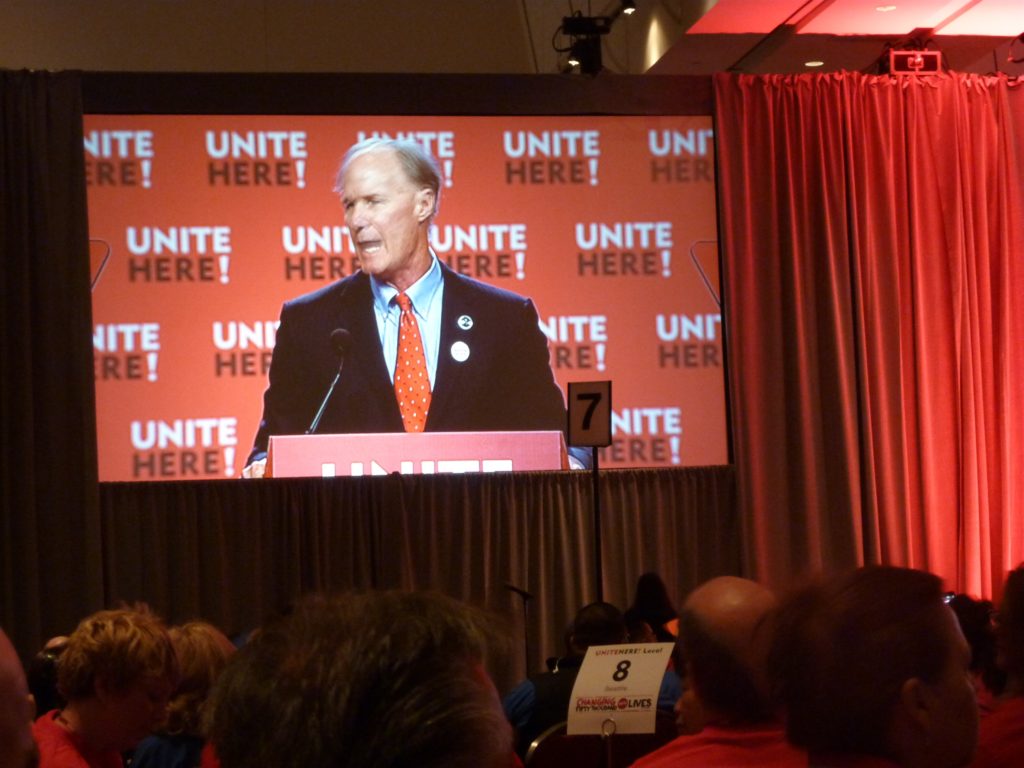Will Team Biden Weaponize Workers’ Pensions?
Big Labor abuse of worker pension and benefit funds as a means of advancing union bosses’ self-aggrandizing policy objectives is a familiar phenomenon.

Nevada Politicians Show They ‘Don’t Believe Their Own Rhetoric’
Union-label senators and assemblymen in Carson City, Nev., won the applause of Big Labor bosses across the country in early June by tightening union officials’ stranglehold over the provision of public services in a state where employees’ Right to Work has been protected for more than six decades.
Under S.B.135, rubber-stamped by the Nevada General Assembly on June 2, government union bosses who already wield monopoly-bargaining privileges over Nevada teachers and local employees, including police and firefighters, will be handed similar power over roughly 20,000 state employees.
This legislation has not yet been signed by Big Labor Gov. Steve Sisolak (D) as this newsletter edition goes to press.
But given that Mr. Sisolak declared his support for granting union officials “exclusive” bargaining control over state government employees like prison guards and highway patrolmen during his 2019 State of the State address in January, his approval is a virtual certainty.
Concerns About the Potential Vast Cost to Taxpayers Delayed Bill’s Passage
At the time the monopoly-bargaining legislation was originally introduced, the Committee sent out a grass-roots mailing to pro-Right to Work citizens statewide, alerting them to the danger.
“Under government-sector monopoly-bargaining laws,” explained Committee Vice President John Kalb, “civil servants are prohibited from dealing directly with their employer on workplace matters.
“Government union officials alone have the power to join with public employers to determine what wages, benefits, and work rules will be. Workers who would prefer to negotiate on their own behalf are prohibited from doing so.
“At the same time, elected officials and their appointees lose, to a substantial degree, the authority to allocate government resources in a way they believe is in taxpayers’ best interest. Union bosses have an effective veto power over elected officials’ decisions.
“Not surprisingly, the growth of government spending and taxes typically skyrockets when monopoly-bargaining laws are adopted and implemented.
“A study by the Nevada Policy Research Institute [NPRI] plausibly predicted that passage of S.B.135 would raise the annual cost of state government to Nevada taxpayers by $500 million.”
Publicly, Big Labor politicians tried to brush aside the NPRI’s findings. But privately, they were clearly concerned about a taxpayer backlash if they rammed through S.B.135. That’s undoubtedly why action on the bill was delayed for months.
National Union Bosses Flew To Nevada to Turn up the Pressure on Lawmakers
By April, national union bosses realized that expanding their monopoly-bargaining privileges in Nevada wasn’t going to be as easy as they had anticipated this winter.
To show they meant business, in May American Federation of State, County and Municipal Employees union czar Lee Saunders and UNITE HERE union honcho Donald “D” Taylor personally visited Nevada.
“What we’re saying is you can’t be our friend in October and November and forget us in January, February, March, April and May,” warned Mr. Taylor at a union rally held outside a state government office building in Las Vegas.
According to the Associated Press, Taylor also said that, with only a few weeks left in the legislative session, Organized Labor was determined to collect “on an I.O.U.”
Finally, on May 29, Sisolak staffers and apprehensive union-label senators gave the green light for a Finance Committee hearing on a “compromise” version of S.B.135, narrower in scope than the original bill, but still antithetical to state employees’ individual rights and taxpayer interests.
‘Compromise’ a ‘de Facto Admission’ That Government Unionism Hurts Taxpayers
Mr. Kalb explained: “Just like the original version of S.B.135, the ‘compromise’ strips state government employees of the freedom to seek to be rewarded for their individual workplace performance.
“Unlike the original version, S.B.135, as passed, says that the Legislature can potentially veto exorbitant monopoly-bargaining deals.
“As Las Vegas Review-Journal columnist Victor Joecks has pointed out, this revision is Big Labor politicians’ ‘de facto admission’ that monopolistic government unionism is detrimental to taxpayers.
“Union-boss legislators and Steve Sisolak have now shown they don’t believe their own rhetoric.
“But that’s hardly a comfort for the state civil servants who will lose their freedom and the state taxpayers who will be gouged as a consequence of S.B.135’s being given the green light despite its manifest dangers.”
If you have questions about whether union officials are violating your rights, contact the Foundation for free help. To take action by supporting The National Right to Work Committee and fueling the fight against Forced Unionism, click here to donate now.

Big Labor abuse of worker pension and benefit funds as a means of advancing union bosses’ self-aggrandizing policy objectives is a familiar phenomenon.

Leaked CTU Proposals Won’t Do Anything to Improve Schools’ Poor Performance

What impact does handing a union monopoly power to deal with your employer on matters concerning your pay, benefits, and work rules have on your pay?